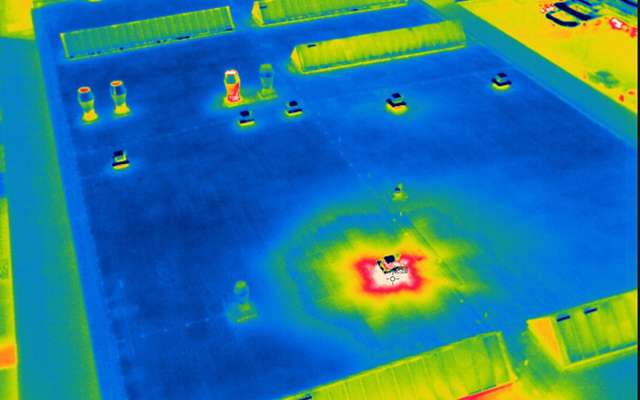Roofing is perhaps the most essential part of protecting your building or business from the elements. Because your roof is under so much pressure to keep out rain, snow, and debris, it’s often the first portion of your building’s exterior to fail. Below, we’re discussing what infrared roof moisture detection is, how it works, and the top seven benefits of using this technology to detect roof moisture, issues, and potential leaks.
What is Infrared Roof Moisture Detection?
First, it’s helpful to know exactly what this technology is. Infrared (IR) roof moisture detection begins with the use of an IR imager, which scans your roof for signs of radiant heat being emitted by the moisture in the roof assembly. Moisture in your roof’s assembly is usually due to wet insulation.
How Does it Work?
The process is very simple and straightforward. Throughout the day, your roof heats up as it absorbs sunlight. The amount of heat your roof absorbs is known as its solar load. The solar load dissipates towards the evening. At this time, your roofing membrane will begin to cool faster than the moisture beneath. Because water has a slower rate of heat transfer than your building material, moist areas of your roof will emit heat more slowly at night, as the waterproofing membrane cools down.
IR imagers are used on your roof at night to detect areas that are releasing higher amounts of heat, indicating the portions of your roof that are absorbing moisture and potentially leaking water into your building.
Benefits of Infrared Roof Moisture Detection
There are several ways to detect leaking or high-moisture areas of your roof, but IR scanning is one of the most efficient. Below are the seven biggest benefits of using this IR technology to scan your roof.
1) Locate Damaged Roof Areas (Including Insulation) – while other forms of detection only report heavy leaks, IR roof moisture detection will show you any and all areas where moisture is permeating your roof membrane. It will show you areas where insulation has been affected and rendered useless.
2) Determine Acceptable Roof Areas – IR scanning will show heat release on a sliding scale, which means it will show you the most effective portions of your roof that have no issue or very low potential for leaking. This is helpful in reducing the number of repairs you need to carry out.
3) Non-destructive – this technology requires no damage to your building material, no added load to your structure, like there is with flood testing, and little to no foot traffic on your roof, reducing or even eliminating the negative impact on your roof’s integrity.
4) Provide a Quality Assurance Report – because IR roof moisture detection is so accurate, a highly-trained thermographer can provide you with a quality assurance report, meaning you can feel 100% confident in the results and the integrity of your roof once the testing is completed. You’ll be able to use the results to ensure proper roof functionality following purchase or construction.
5) Verify Roof Condition Before a Warranty Expiration – IR scanning can be extremely useful for determining issues before the warranty on your materials or installation is up. Accurate testing can save you thousands of dollars if your warranty covers the needed repairs indicated by the report.
6) Determine the Extent of Storm Damage for a Claim – if your roof potentially suffered damage during a storm, an IR scan can give you an accurate report that can help you file an insurance claim. Having IR roof moisture detection done could mean the difference between a claim being approved or denied.
7) Provide Legal Documentation on the Condition of the Roof – lastly, if you ever need to represent the integrity of your roof in a legal setting, an IR scan can provide proper documentation for you or your legal representation, potentially changing the course of litigation or roof repairs.
Infrared roof moisture detection is a perfectly safe, non-invasive, and highly accurate way to get your roof’s integrity tested and reported. Whether you need a report for legal or insurance purposes, or you’re simply looking to keep your building fully protected from potential damage, contact one of our highly-trained infrared detection experts to discuss how IR roof scanning could be the right choice for you and your business.

